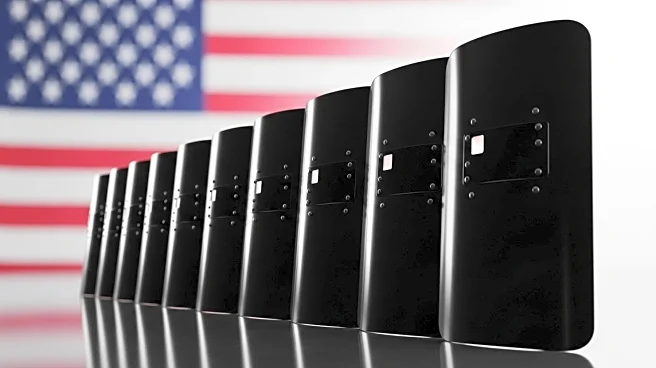What's Happening?
The Trump administration is defending its decision to deploy National Guard troops to Chicago amid escalating protests against immigration enforcement operations. The Justice Department has filed a 59-page document citing recent violent incidents, including protests at the Immigration and Customs Enforcement facility in Broadview and attacks on Border Patrol vehicles. Illinois officials have challenged the deployment, arguing it infringes on state sovereignty and is unconstitutional. U.S. District Judge April Perry is set to hear arguments in federal court, with the case drawing significant national attention.
Why It's Important?
The deployment of National Guard troops in Chicago highlights tensions between federal and state authorities over immigration enforcement. Illinois officials, including Governor JB Pritzker, argue that the federalization of troops violates state rights and the Posse Comitatus Act, which restricts military involvement in civilian law enforcement. The situation underscores the broader national debate on immigration policy and federal authority, with potential implications for state-federal relations and civil liberties. The outcome of the court case could set a precedent for future federal interventions in state matters.
What's Next?
The court proceedings are expected to be lengthy, with various stakeholders, including national law enforcement groups and political leaders, weighing in. Judge Perry's decision could either uphold or block the deployment, influencing future federal actions in similar situations. The Trump administration has hinted at invoking the Insurrection Act to bypass legal challenges, which could further escalate tensions. The case's resolution will be closely watched for its impact on federal-state dynamics and immigration enforcement policies.
Beyond the Headlines
The deployment raises ethical and legal questions about the use of military force in domestic affairs. Critics argue that the move is politically motivated, using military personnel as props in a broader strategy to assert federal control over immigration enforcement. The situation also reflects ongoing political divisions, with Illinois officials accusing the Trump administration of manufacturing a crisis to justify military intervention. The case could have long-term implications for civil-military relations and the balance of power between federal and state governments.











